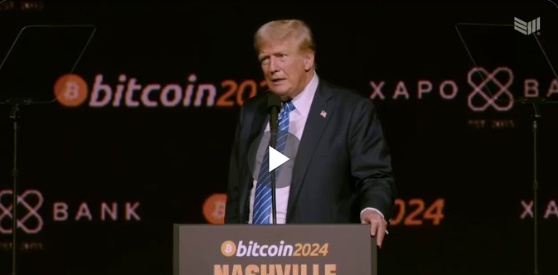Former President Donald Trump, addressing the Bitcoin Conference in Nashville, announced his intention to ensure the federal government retains its bitcoin holdings if he returns to the White House. While Trump refrained from suggesting an official federal reserve of digital currency, he emphasized the importance of not selling off the government’s bitcoin assets, reflecting a significant shift in his stance on cryptocurrencies.
“Never sell your #Bitcoin.” – Donald J. Trumppic.twitter.com/Cusnkib64h
— Michael Saylor⚡️ (@saylor) July 28, 2024
During his speech, Trump outlined his vision for the United States to become a global leader in cryptocurrency, positioning the country as the “crypto capital of the planet” and a “bitcoin superpower.” His remarks come amidst the 2024 presidential race, where candidates are increasingly courting the support of the fintech community. Trump’s proposal, however, was less radical compared to others at the conference, such as Robert F. Kennedy Jr.’s pledge to create a 4 million bitcoin reserve using government-held bitcoin from criminal seizures.
Senator Cynthia Lummis of Wyoming also introduced a legislative proposal to establish a U.S. federal reserve of 1 million bitcoin over five years, with the purpose of reducing national debt. Trump’s statements, while cautious, still marked a departure from his previous skepticism towards cryptocurrencies, which he once dismissed as scams.
Trump’s speech was also a critique of the Biden administration’s regulatory approach to cryptocurrencies. He accused President Joe Biden and Vice President Kamala Harris of stifling the industry, labeling their actions as a “war on crypto.” Trump pledged to dismantle these regulations and proposed creating a “bitcoin and crypto presidential advisory council,” with members supportive of the crypto industry. He also controversially vowed to dismiss SEC Chairman Gary Gensler, although he acknowledged the limitations of presidential power in this regard.
“NEVER SELL YOUR BITCOIN “ -Donald Trump #Bitcoin2024 pic.twitter.com/GBSQ9wPiER
— Altcoin Daily (@AltcoinDailyio) July 27, 2024
The former president’s newfound embrace of bitcoin is a significant reversal from his earlier views. In 2019, Trump had criticized bitcoin, stating it was not a real currency and was based on “thin air.” However, Trump son’s have had many conversations with him on crypto and the benefits of it. As Trump evolved his views, the growing influence of the crypto lobby and significant donations from the tech community have likely influenced him as well. Notable figures in the crypto space, such as the Winklevoss twins and other venture capitalists, have pledged substantial financial support to Trump’s campaign.
As Trump continues to advocate for a more crypto-friendly regulatory environment, it remains to be seen how the Democratic Party will respond. Some Democrats, like Rep. Wiley Nickel and Rep. Ro Khanna, have called for bipartisan cooperation on crypto regulation, stressing that the issue should not become a partisan battleground. The Democratic Party, particularly with Vice President Kamala Harris emerging as a key figure, may need to reassess its stance on cryptocurrency regulation in light of these developments.
🇺🇸 BREAKING: “Never sell your #Bitcoin! The federal government holds 210,000 $BTC. If elected, my administration will keep 100% of all Bitcoin the US owns.” – Donald Trump. pic.twitter.com/SIggqzCnEG
— Cointelegraph (@Cointelegraph) July 27, 2024
Major Points:
- Former President Donald Trump pledged to keep the federal government’s bitcoin holdings intact if he returns to office, aiming to position the U.S. as a global leader in cryptocurrency.
- At the Bitcoin Conference in Nashville, Trump’s plan was less radical compared to others, like Robert F. Kennedy Jr.’s proposal to create a 4 million bitcoin reserve and Senator Cynthia Lummis’ plan for a 1 million bitcoin federal reserve.
- Trump criticized the Biden administration’s regulatory approach to cryptocurrencies, describing it as a “war on crypto,” and promised to dismantle restrictive regulations if elected.
- This marks a significant change in Trump’s stance on cryptocurrencies, as he previously dismissed bitcoin as a scam and not a real currency.
- The support and donations from prominent figures in the crypto industry, such as the Winklevoss twins and venture capitalists, highlight the increasing political influence of the crypto sector.
Susan Guglielmo – Reprinted with permission of Whatfinger News







